BBC News
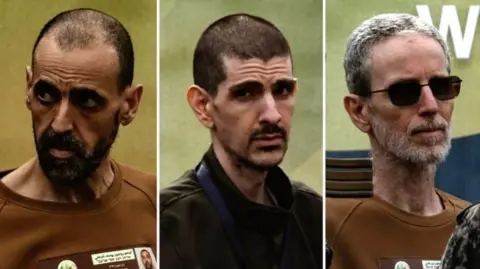 EPA-EFE/REX/Shutterstock
EPA-EFE/REX/ShutterstockHamas has freed three Israeli hostages in Gaza, while Israel released 183 Palestinian prisoners in the latest exchange as part of an internationally brokered ceasefire deal.
The three hostages – Eli Sharabi, Ohad Ben Ami and Or Levy – were handed over to the Red Cross on Saturday morning before reuniting with family in Israel.
Concerns have been raised about their wellbeing, with Mr Sharabi’s family – who live in the UK – describing their shock at his “gaunt” appearance.
Returning Palestinian prisoners were greeted with scenes of celebration at Ramallah in the occupied West Bank. Representatives claimed they all needed “medical care”, without giving specifics.
So far, 21 hostages and 566 prisoners have been freed since the ceasefire began on 19 January.
By the end of the first stage of the ceasefire in three weeks time, 33 hostages and 1,900 prisoners are expected to have been freed. Israel says eight of the 33 are dead.
As Mr Sharabi, Mr Ben Ami and Mr Levy were handed over to the Red Cross in Deir al-Balah, central Gaza, crowds lined up, cordoned off by a row of armed fighters, to watch and film on mobile phones, as Hamas and Palestinian flags flew.
A Hamas official and Red Cross representative signed paperwork on a stage to complete the handover. The hostages were then paraded on stage, flanked by men with guns. The three men posed holding certificates and answered questions into a microphone, before waving as they were ushered into Red Cross vehicles.
Israeli President Isaac Herzog expressed horror at the physical state of the men who he said were “returning after 491 days of hell, starved, emaciated and pained”.
Prime Minister Benjamin Netanyahu also criticised the men’s state and accused Hamas of “repeated violations” of the ceasefire deal, without providing specifics.
Speaking to BBC Arabic on Saturday, Hamas spokesman Hazem Qassem said the latest release of Israeli hostages had been carried out in a “civilised manner”.
He also accused Israel of “dragging its feet” on implementing humanitarian relief agreed as part of the ceasefire.
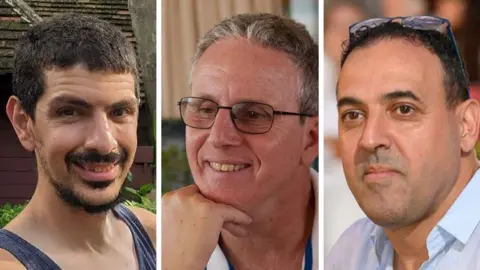 The Hostages and Missing Families Forum
The Hostages and Missing Families ForumNetanyahu’s co-ordinator of prisoners and missing persons said Israel treated the issues with “great severity” and would raise them with ceasefire mediators and take action.
Mr Sharabi’s brother-in-law, Steve Brisley, told the BBC that having confirmation he is alive is “what we’ve been working toward for the last 16 months”.
It was “incredibly difficult” to see him “thin, gaunt” and being paraded by Hamas, Mr Brisley said. “It’s the light that’s gone from his eyes that’s really struck home for me.”
The Hostages and Missing Families Forum said in a statement that “the disturbing images” of the release “serve as yet another stark and painful evidence that leaves no room for doubt – there is no time to waste for the hostages! We must get them all out, down to the very last hostage”.
Meanwhile, the International Committee of the Red Cross (ICRC), which facilitated the handover, said it was “increasingly concerned about the conditions surrounding release operations”.
“We strongly urge all parties, including the mediators, to take responsibility to ensure that future releases are dignified and private,” it said.
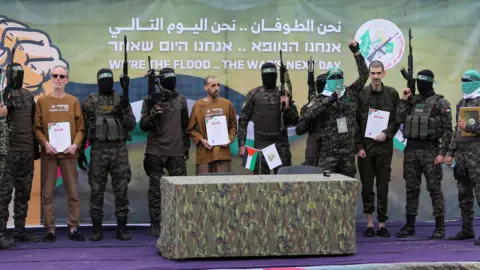 Reuters
ReutersLater on Saturday, Israel released 183 Palestinian prisoners. More than 70 are serving life or long sentences, and 111 are Gazans detained during the war. Seven are due to be deported.
Seven of the released prisoners were admitted to hospital in Ramallah because of poor health, the Palestinian Prisoners’ Club told AFP.
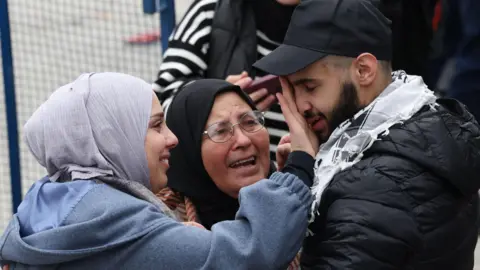 EPA
EPA“All the prisoners who were released today are in need of medical care, treatment, and examinations as a result of the brutality they were subjected to during the past months,” the group’s Abdullah al-Zaghari said.
One of those released was Jamal al-Tawil, 61, a prominent Hamas politician in the West Bank and former mayor of the village of al-Bireh, who has spent more than 19 years in and out of Israeli prisons.
His daughter Bushra al-Tawil was freed in an earlier prisoner release in January.
Both father and daughter were most recently held without charge, media reported.
Khadra al-Daghma, the mother of another released Palestinian prisoner, described feeling “so happy, overjoyed” having seen her son for the first time in 15 years.
“My heart is filled with happiness,” she told a reporter in Gaza, adding that her son, Ammar Fadel al-Daghma, had “changed a lot” and was “not the same”.
According to the Israeli Prison Service, he was detained for offences including arson, attempted murder and service to an illegal organisation.
Hamas seized 251 hostages and killed about 1,200 people when it attacked Israel on 7 October 2023, triggering the war.
At least 47,500 Palestinians have been killed in Israel’s offensive, according to Gaza’s Hamas-run health ministry. About two-thirds of Gaza’s buildings have been damaged or destroyed by Israel’s attacks, the UN says.
Eli Sharabi, 52, was taken from Kibbutz Beeri with his brother, Yossi, whose death has since been confirmed. Eli’s British-born wife, Lianne, and two daughters, Noiya and Yahel, were murdered in the attack.
During his release, Mr Sharabi was filmed saying he was “very happy today to return to…my wife and daughters”, adding to concerns he was unaware his family had been killed.
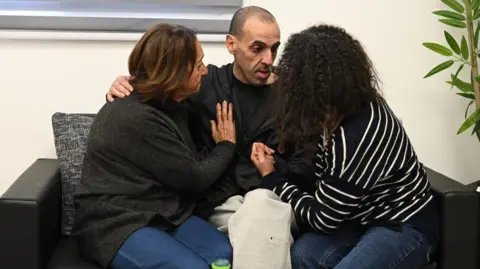 IDF Spokesperson
IDF SpokespersonOhad Ben Ami, 56, was also taken from Kibbutz Beeri, along with his wife, Raz. She was later released by Hamas.
Mr Ben Ami, an accountant, is “known for his good judgment and sense of humour”, according to the Hostages Families Forum.
Or Levy, 34, a computer programmer from Rishon LeZion, a city south of Tel Aviv, fled the Nova festival with his wife Eynav, when gunmen attacked the event.
Mr Levy was taken hostage and Eynav’s body was found in a bomb shelter where the couple had been hiding.
Hours before they released the hostage names on Friday, Hamas accused Israel of failing to abide by its commitment to boost the amount of humanitarian aid allowed into Gaza as part of the ceasefire deal.
The head of Hamas’s media office in Gaza, Salama Marouf, told a news conference in Gaza City: “The humanitarian situation remains catastrophic due to Israeli obstruction”.
He said only 8,500 out of an expected 12,000 aid lorries had entered Gaza since the ceasefire came into effect, and medical equipment and shelter supplies had been deliberately delayed, according to media reports.
The allegation contradicts UN humanitarian chief Tom Fletcher, who on Thursday said 10,000 lorries with food, medicine and tents had crossed into Gaza since the start of the ceasefire in what he called “a massive surge”.
Saturday’s exchange took place as US President Donald Trump continued to push his widely criticised proposal to move all Palestinians from Gaza and redevelop it as an international travel destination.
His announcement – for the US to “take over” the Gaza Strip, resettle its Palestinian population and turn the territory into the “Riviera of the Middle East” – has complicated talks on the planned next stage of the ceasefire.
But Israeli negotiators are still expected to meet mediators in Qatar later on Saturday.
Trump’s idea was strongly condemned by Arab countries and the UN.



